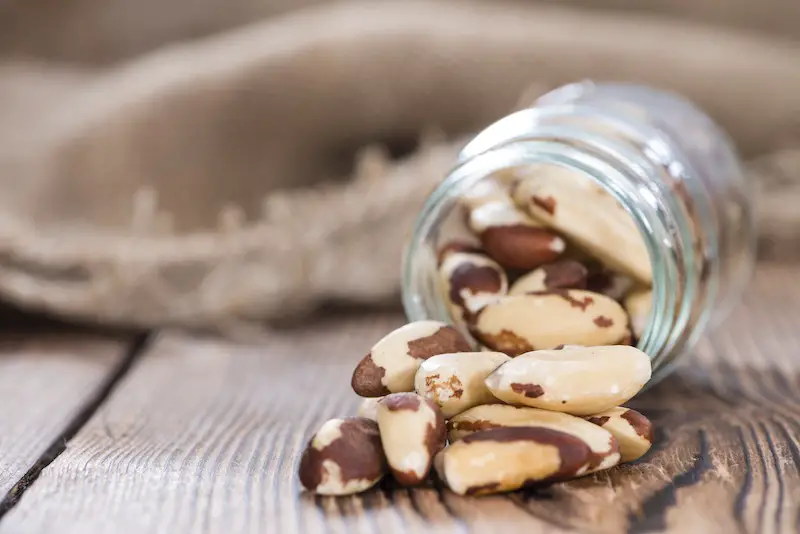
Selenium is one of many essential minerals needed in the body for good health. Too much, or too little, can be harmful to overall wellness.
With the right amount of selenium in the body, it can promote good immunity, thyroid health, a proper sleep cycle, and even fertility.
Here’s what you need to know about the benefits of selenium, how to make sure you’re getting the right amount, and how to supplement if needed.
[toc]
What is Selenium?
Selenium is a mineral that is naturally found in many foods like Brazil nuts, eggs, and seafood. It functions as an antioxidant in the body and works to boost levels of another important antioxidant, glutathione.
Most people in the U.S. and developed countries get enough selenium each day from food and supplements, but those who live in countries with poor soil quality may not get enough.
7 Research-Backed Benefits of Selenium
Selenium is needed in the body for several key reasons. With too little, health problems can develop, and too much from excessive supplementation can also be an issue. More is not always better!
These are the top reasons why selenium—in the right amounts—supports good health.
1. Reduces Inflammation in the Body
Selenium functions as an antioxidant, which naturally combats inflammation. It does this by boosting the function of glutathione, known as the “mother of all antioxidants,” but also by increasing the activity of certain genes that produce antioxidant defenses.
This benefit is especially seen in cooling the chronic inflammation that exists in autoimmune and chronic disorders. (source)
Selenium can also reduce C-reactive protein, an inflammatory marker often associated with cardiovascular disorders or risks.
It works to block DNA transcription factors in the body that release inflammatory substances into the bloodstream, keeping systemic inflammation levels lower. (source)
2. Supports Brain Health and Decreases Mental Decline
Many nutrients are crucial for brain health, and selenium is an equally important one. Selenium is especially helpful for boosting the healthy effect that omega-3 fatty acids have on the brain, by improving how they work.
In studies done on eating or taking omega-3 fats for brain health, it was found that eating seafood actually boosted blood selenium levels more than omega-3 fatty acid levels.
Both are required to boost cognitive function and prevent mental decline, like that associated with Alzheimer’s and dementia. (source)
Research also shows that those with existing Alzheimer’s have lower blood levels of selenium than those who don’t have it—by as much as 40 percent. (source)
The sixth leading cause of death in the U.S., Alzheimer’s is a serious problem for which there is no known cure.
As studies continue to determine what helps and what is preventative, research continues to show that diets rich in selenium foods, as well as moderate supplementation, can help to protect and improve cognitive function.
3. Protects Heart Health
Cardiovascular disease is a complex set of factors that can lead to life-threatening consequences like heart attack. Research shows that factors that are protective include lowering inflammation levels and reducing oxidative stress in the body—both of which are supported by dietary antioxidants.
Selenium is so important for heart health that when levels fall too low, it can make blood vessels more likely to develop plaque, and blood becomes stickier and more prone to clotting.
When selenium levels are increased by 50 percent, in someone who previously had lower levels, it can reduce the risk of developing heart disease by 24 percent. (source)
Glutathione is also an important antioxidant for heart health and cardiovascular disease reduction, and selenium helps to increase this significantly.
4. Supports a Healthy Sleep-Wake Cycle
Selenium contains an amino acid, methyl selenocysteine, that helps to promote a normal circadian rhythm, even when it’s not taken right before bed.
Research shows that this amino acid reminds certain genes to work more effectively at nighttime to prepare the body for sleep. Found naturally in foods like garlic, onions, and broccoli, moderate selenium supplementation might also be helpful.
Selenium is especially important when it comes to addressing sleep disorders or insomnia, although an ideal level of supplementation hasn’t been determined by research.
Working with a doctor and nutritionist to boost selenium intake safely is a healthy way to support a good sleep routine.
5. Increases Natural Immunity
The immune system has many functions in the body, but a primary one is fending off threats from outside invaders like bacterial infections and viruses. When the body is excessively stressed, even from oxidative stress, the immune system is weakened and does not protect as well.
Selenium reduces oxidative stress and helps your immune system work as it should. When levels are too low in the body, the immune response is decreased and sickness occurs more frequently. (source)
Research finds selenium particularly helpful when fighting cases of the flu, tuberculosis, and even hepatitis C. (source)
It can also help the immune system work to protect against specific threats, like asthma, immune-driven allergies, and even cancer in some cases. (source)
6. Supports Natural Thyroid Health
When found in the body, selenium concentrations are highest in the thyroid gland. When levels fall too low, this deficiency can be part of the development of autoimmune thyroid disease. (source)
There are two types of autoimmune thyroid diseases: Hashimoto’s thyroiditis and Graves’ disease. Hashimoto’s is autoimmune hypothyroidism, where the gland’s function is permanently reduced after the immune system attacks it and destroys its ability to function, in part or completely.
Graves’ disease is autoimmune hyperthyroidism, where the immune system revs the gland into overdrive and still ultimately weakens it.
Low levels of selenium are found to be a risk factor for the development of autoimmune thyroid problems. (source)
When someone already has existing thyroid disease, whether it is Graves’ disease or Hashimoto’s thyroiditis, selenium can help to reduce the antibodies found from the disease and promote remission and a reduction in symptoms. (source)
Selenium also supports thyroid health in pregnant and postpartum women, who are especially prone to thyroid disturbances. (source)
7. Supports Natural Fertility in Men and Women
Both men and women need selenium for healthy fertility and reproduction.
In men, selenium is an antioxidant that protects sperm health and supports healthy levels of testosterone. Supplementing with this antioxidant can boost sperm quality and motility after just three months.
In just one study, 11 percent of men supplementing with selenium went on to have children, while none in the placebo group did. (source)
For women, selenium is more critical in the first weeks of pregnancy. When levels are too low, it has been associated with an increased risk of early miscarriage and recurrent miscarriage. (source)
Problems with Having Low or High Selenium Levels
It’s not good to have too much or too little selenium in the body. When this happens, certain signs and symptoms can show.
Problems with too much selenium, such as from taking excessive supplements, can include:
- Increased risk of type 2 diabetes or elevated blood sugar
- Nausea and vomiting
- Diarrhea
- Stomach and digestive pain
- Low blood pressure
- Fast heartbeat (higher than 100 beats per minute)
- Skin rashes and irritation
- Tremors and muscles spasms
Problems with too little selenium include:
- Muscle weakness
- Poor cognitive health and memory
- Anemia
- Rheumatoid arthritis
- Miscarriage
- Anxiety and depression
The 10 Foods Highest in Selenium

Many foods are rich sources of selenium. Regularly eating these can ensure that your selenium levels are not too low. Sometimes supplementation is still needed, depending on your health conditions, but starting with diet is always important.
Try these foods to boost your selenium levels naturally.
1. Seafood
All seafood contains some selenium, but the types highest in this nutrient include yellowfin tuna, sardines, oysters, clams, salmon, shrimp, and halibut.
2. Brazil nuts
Not all nuts are created equal when it comes to selenium levels. Six nuts contain more than a day’s serving of selenium so much so that you should not eat Brazil nuts every day to ensure you don’t get too much.
3. Meat
While most meats will have some selenium, the types that contain the most are ham, pork, beef, turkey, chicken, beef liver, and chicken liver. The quality of the meat matters here, with organic, pastured, and grass-fed varieties containing higher levels of nutrients.
4. Dairy products
While most cow-based dairy products contain some selenium, the types with the highest amounts are cottage cheese (which provides 30 percent of the daily need in just one cup), whole milk, and Greek yogurt (both of which are closer to 10 percent daily need).
Keep in mind that if you’re sensitive to dairy products or struggle to digest them, eating them for nutritional benefit won’t be as effective, because your food needs to be properly broken down to extract the nutrients from it.
5. Eggs
One egg provides close to 30 percent of the selenium you need each day.
6. Vegetables
Not all veggies supply you with selenium, but a few provide decently high amounts, including mushrooms, spinach, and red Swiss chard.
7. Brown rice
Long-grain brown rice gives you almost 30 percent of your daily serving size per cup, but the nutrients are best extracted when paired with another selenium-rich meat.
8. Oats
Cooked oatmeal from regular or steel-cut oats will provide about 15 percent of your daily selenium needs.
9. Sunflower seeds
One-fourth of a cup gives you about 15 percent of your daily selenium needs, making them an allergy-friendly and delicious way to boost this mineral in your diet.
10. Cashews
Not nearly as high in selenium as Brazil nuts, cashews are the next highest nut in selenium.
How Much Selenium Do You Need?
Selenium is a vital mineral for health, but getting the right amount is important. Selenium needs differ based on age and stage of life.
Daily selenium requirements are:
- 20 micrograms per day for children ages 1 to 3
- 30 micrograms per day for children ages 4 to 8
- 40 micrograms per day for children ages 9 to 13
- 55 micrograms per day for anyone age 14 and older
Women who are pregnant require 60 micrograms per day, and breastfeeding women need 70 micrograms daily.
More selenium could be considered safe, and ultimately, most adults in the U.S. get closer to 100 micrograms per day. When it comes to selenium, though, it’s important to consider the tolerable upper intake, which is a level set to ensure that toxicity doesn’t occur.
Consuming selenium at higher levels than this on a regular basis could result in levels that are too high and problematic.
The tolerable upper intake for selenium is as follows:
- 45 micrograms for infants birth to 6 months
- 60 micrograms for babies 7 to 12 months
- 90 micrograms for children ages 1 to 3
- 150 micrograms for children ages 4 to 8
- 280 micrograms for children ages 9 to 13
- 400 micrograms for anyone age 14 and older, including pregnant and breastfeeding women
How to Supplement with Selenium
Depending on your health status and needs, your healthcare provider or nutritionist may recommend supplementing with additional selenium.
It’s important that when you do this, you pay attention to the overall amount you’re likely getting from your diet and all supplements combined. Remember that if you take a multivitamin, it will also contain some selenium.
Additionally, if you regularly take vitamin D supplements, these have been shown to boost selenium levels in a roundabout way.
While the recommended daily intake is just 55 micrograms for adults, most studies examining selenium benefits utilize doses between 100 and 200 micrograms per day.
Multivitamins can contain anywhere from 50 micrograms to upwards of 200 micrograms per serving size, so be sure to check the dose on yours before adding a standalone selenium supplement.
Cautions & Who Should Not Take
You should not take selenium supplements if you eat Brazil nuts regularly or if your doctor has told you not to. Even if your doctor has not, it’s always best to run supplements by your healthcare provider before starting anything new.
Share on Pinterest

Aimee McNew, MNT, CNTP, is a certified nutritionist who specializes in women’s health, thyroid problems, infertility, and digestive wellness. She ate her way back to health using a Paleo diet, lost 80 pounds, and had a healthy baby after numerous miscarriages. She focuses on simple nutrition practices that promote long-lasting results.

